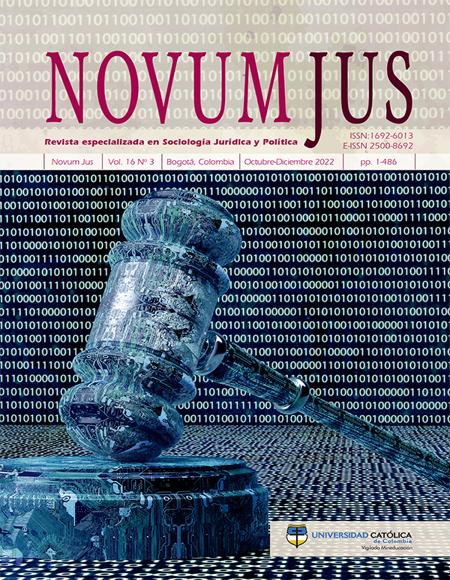
This work is licensed under a Creative Commons Attribution-NonCommercial 4.0 International License.
Authors who publish with this journal agree to the following terms:
- Authors retain copyright and grant the journal right of first publication with the work simultaneously licensed under a Creative Commons Attribution Non-Commercial License that allows others to share the work with an acknowledgement of the work's authorship and initial publication in this journal.
- Authors are able to enter into separate, additional contractual arrangements for the non-exclusive distribution of the journal's published version of the work (e.g., post it to an institutional repository or publish it in a book), with an acknowledgement of its initial publication in this journal.
- Authors are permitted and encouraged to post their work online (e.g., in institutional repositories or on their website) prior to and during the submission process, as it can lead to productive exchanges, as well as earlier and greater citation of published work (See The Effect of Open Access).
Abstract
This article exposes the judicial precedent from the conception of the treatise writer Michele Taruffo, seen from the legal systems of common law and civil law, studying in turn its dimensions. The development that the precedent has had in the Colombian legal system is addressed and contrasted with the reflections made around this institute by the Italian jurist, to conclude that the precedent in Colombia has a degree of effectiveness that translates into what Taruffo has classified. like binding, must-except. The research method was qualitative, descriptive with a historical approach.

References
Merkl, Adolfo, traducido por Juan L. Fuentes Osorio y Miguel Azpitarte Sánchez. “Prolegómenos a una teoría de la estructura jurídica escalonada del ordenamiento”. Revista de Derecho Constitucional Europeo, núm. 2 (julio-diciembre 2009): 235-259.
Quintero, Christian. “El problema de los indiscernibles”. Revista Colombiana de Filosofía de la Ciencia VIII, núm. 16-17 (2007): 7-19. https://www.redalyc.org/pdf/414/41401701. pdf (acceso febrero 6, 2022).
República de Colombia, Congreso de la República. Ley 1437 de 2011, “Por la cual se expide el Código de Procedimiento Administrativo y de lo Contencioso Administrativo”. Bogotá: Diario Oficial núm. 47 956, de enero 18 de 2011.
República de Colombia, Congreso de la República. Ley 153 de 1887, “Por la cual se adicionan y reforman los códigos nacionales, la Ley 61 de 1886 y la 57 de 1887”. Bogotá: Diarios Oficiales núm. 7151 y 7152, de agosto 28 de 1887.
República de Colombia, Congreso de la República. Ley 169 de 1896, “Sobre reformas judiciales”. Bogotá: Diario Oficial núm. 10 235, de enero 14 de 1897.
República de Colombia, Congreso de la República. Ley 270 de 1996, “Estatutaria de la administración de justicia”. Bogotá: Diario Oficial núm. 42 745, de marzo 15 de 1996.
República de Colombia, Corte Constitucional. Sentencia C-037 de 5 de febrero de 1996. M. P. Vladimiro Naranjo Mesa.
República de Colombia, Corte Constitucional. Sentencia C-113 de 25 de marzo de 1993. M. P. Jorge Arango Mejía.
República de Colombia, Corte Constitucional. Sentencia C-252 de 28 de febrero de 2001. M. P. Carlos Gaviria Díaz.
República de Colombia, Corte Constitucional. Sentencia C-447 de 18 de septiembre de 1997.
M. P. Alejandro Martínez Caballero.
República de Colombia, Corte Constitucional. Sentencia C-537 de 30 de junio de 2010. M. P. Juan Carlos Henao Pérez.
República de Colombia, Corte Constitucional. Sentencia C-836 de 9 de agosto de 2001. M. P. Rodrigo Escobar Gil.
República de Colombia, Corte Constitucional. Sentencia SU-047 de 29 de enero de 1999. M. P. Carlos Gaviria Díaz y Alejandro Martínez Caballero.
República de Colombia, Corte Constitucional. Sentencia SU-113 de 8 de noviembre de 2018.
República de Colombia, Corte Constitucional. Sentencia SU-1219 de 21 de noviembre de 2001. M. P. Manuel José Cepeda Espinosa.
República de Colombia, Corte Constitucional. Sentencia T-123 de 21 de marzo de 1995. M. P. Eduardo Cifuentes Muñoz.
República de Colombia, Presidencia de la República. Decreto Ley 2067, “Por el cual se dicta el régimen procedimental de los juicios y actuaciones que deban surtirse ante la Corte Constitucional”. Bogotá: Diario Oficial núm. 40 012, de septiembre 4 de 1991.
República de Colombia. Constitución Política de 1991.
Rollnert Liern, Goran. “La mutación constitucional, entre la interpretación y la jurisdicción constitucional”. Revista Española de Derecho Constitucional, núm. 101 (mayo-agosto, 2014): 125-155.
República de Colombia, Corte Constitucional. Sentencia C-083 de 1 de marzo 1995. M. P. Carlos Gaviria Díaz.
Taruffo, Michele. “El precedente judicial en los sistemas de civil law”. Ius et Veritas 22, núm. 45 (2012): 88-95. https://revistas.pucp.edu.pe/index.php/iusetveritas/article/view/11991 (acceso febrero 15, 2022).
Taruffo, Michele. Aspectos del precedente judicial. Monterrey: Consejo de la Judicatura del Estado de Nuevo León, 2018.
Taruffo, Michele. Cinco lecciones mexicanas: memoria del taller de derecho procesal. Ciudad de México: Tribunal Electoral del Poder Judicial de la Federación, Escuela Judicial Electoral, 2003.M. P. Luis Guillermo Guerrero Pérez.





















